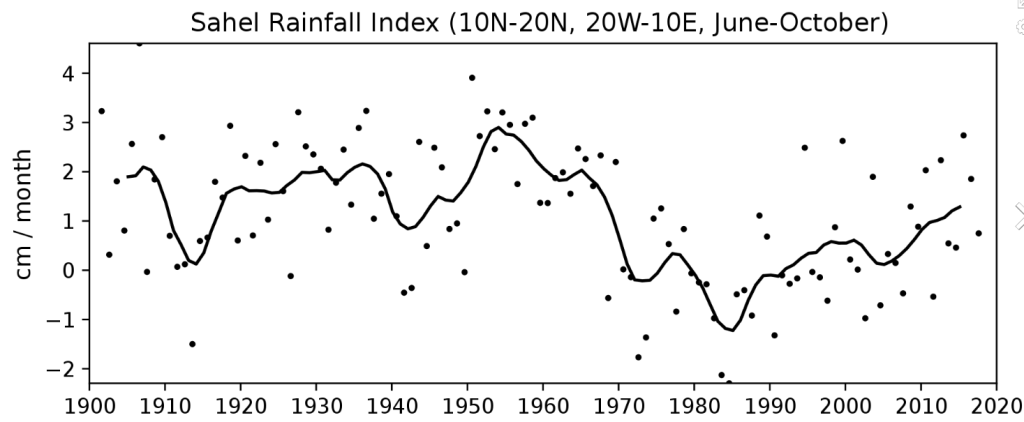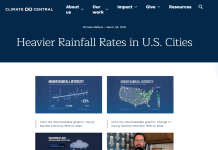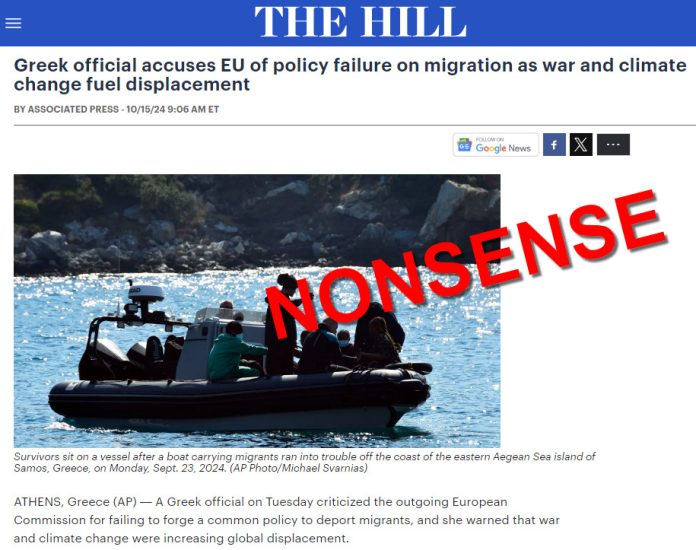An Associated Press (AP) article picked up by the political website, The Hill, claims that Greece is unwillingly becoming the recipient of refugees from the Middle East and Africa that are migrating due to climate change, among other things. This is false. There is no evidence that long-term climate change is forcing anyone to migrate internally within borders or emigrate to foreign nations. This climate change “refugee” story is an ongoing narrative that has been going on in the media for more than 30 years, despite the fact there is no data to support it.
The article, “Greek official accuses EU of policy failure on migration as war and climate change fuel displacement,” says this:
Voultepsi expressed alarm at the growing number of refugees in Lebanon because of ongoing Israeli airstrikes targeting the militant group Hezbollah, and added: “Countries like Somalia, Ethiopia, and South Sudan … are affected by both war and climate change, creating an ever-growing flow of migrants towards Europe.”
Greece is a major entry point for migrants into the European Union, with most crossing from Turkey and Libya in unsafe boats.
First, let’s tackle the obvious. In the article while climate change is mentioned as a driver of refugees from Africa, there is not one mention of how this comes to be. AP simply mentions it as if it were fact without any reference to support it.
As Climate Realism has repeatedly discussed, no evidence shows climate refugees exist. For example, this article from November 2022, “No, CBS News, Drought in Somalia is Not Being Driven by Climate Change,” clearly demonstrated that Somalia, due to its location, is normally mostly arid, as monsoon winds lose most of their moisture by the time they reach the country. This makes it more sensitive to changes in ocean currents than other countries. Plus, history demonstrates that droughts in Somalia have been common all the way back to the 1700’s. Data from the last 120 years in Figure 1 shows rainfall in the Sahel part of Africa, including Somalia, to be highly variable.
The Sahel is a transitional zone between the Sahara Desert to the north and the savannas of North-Central Africa to the south. It includes Burkina Faso, Chad, Mali, Mauritania, and Niger, plus Cameroon, Gambia, Guinea, Nigeria, Senegal, Sudan, and South Sudan.

Figure 1. More than a century of rainfall data in the Sahel show an unusually wet period from 1950 until 1970 (positive index values), followed by extremely dry years from 1970 to 1991. (negative index values). From 1990 until present rainfall returned to levels slightly below the 1898–1993 average, but year-to-year variability was high. Source: Benedikt Seidl – based on JISAO data
In short, drought in the Sahel band in North Africa is a normal and regular occurrence that happened long before man-made climate change was ever an issue. The conclusion then is that other factors, such as war, poverty, political strife, and lack of a stable food supply are the drivers of African refugees rather than the imagined impact of climate change.
In fact, one report says that climate change hasn’t even entered into the migration equation yet, saying that it isn’t expected to be of any significance until mid-century, and then if it happens, is projected to be just 10 percent compared to other factors.
Population growth also figures into emigration, Africa’s population has been steadily increasing and is expected to double from 1.2 billion to 2.5 billion by 2050. This puts extreme pressure on the food and water supplies, resulting in more visible impacts on those countries when normal periods of drought occur.
The AP article also says the Middle East is a source of migrants for Greece, while lumping it in with “climate change” as the cause. This too is unsupported by the data.
The biggest reason for migration from the Middle East is armed conflict and political instability in the region, which often leads to people fleeing war, civil conflict, persecution, political corruption, and human rights violations, resulting in large numbers of refugees and displaced persons. A report by the Pew Research Center Middle East’s Migrant Population More Than Doubles Since 2005, says,
Some of this growth was due to individuals and families seeking economic opportunities. But the majority of the migration surge, especially after 2011, was a consequence of armed conflict and the forced displacement of millions of people from their homes, many of whom have left their countries of birth.
All told, the Middle East’s migrant population increased by about 120% between 2005 and 2015. This far exceeds increases in the combined international migrant and forcibly displaced populations over the same period in continental Africa (91% growth), Latin America and the Caribbean (77%) and the Asia-Pacific region (26%).
The word “climate” isn’t mentioned even once in the report.
Clearly, climate isn’t a driver of refugees into Greece or other countries. People are fleeing the conditions that affect their everyday lives, not some imagined and non-existent threat from climate change. The AP and The Hill could take a lesson from the embarrassing and telling episode from the United Nations where they fabricated a climate migration crisis that never happened. In 2005, the United Nations Environmental Programme (UNEP) issued a warning that a whopping 50 million people could already become environmental refugees by 2010, fleeing the effects of climate change.
But, that never happened, and the UNEP quietly disappeared the claim from their website, but botched the disappearing attempt, adding even more embarrassment.
Now doubling down on failure, the UNEP and other organizations estimate the number of climate refugees by 2050 from 50 million to 1.2 billion people, but these claims have been widely debunked.
It is sad that The Hill chose to republish this false article without doing any due diligence to check the claims. It is doubly sad that the AP, with resources worldwide, didn’t even do a modicum of research before making the false unsourced connection between Greece’s migrant crisis, and climate change. A modicum of research easily proves such a connection false. Such is the pathetic state of our journalism today.


















